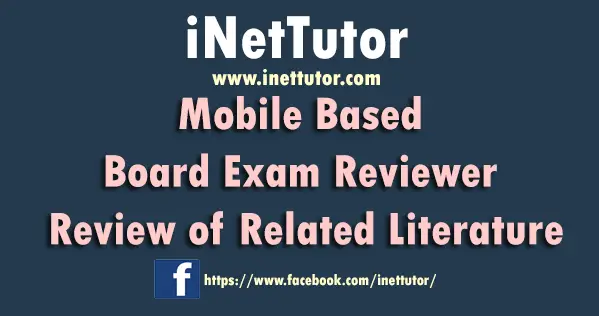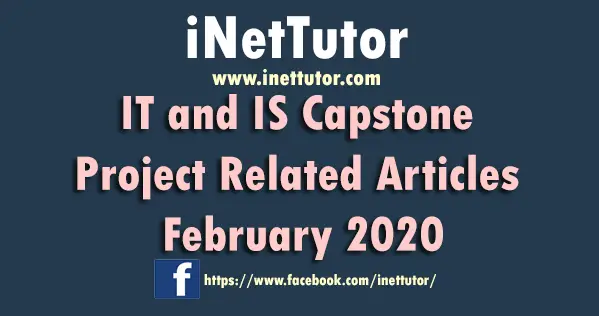Mobile Based Board Exam Reviewer Review of Related Literature
The mobile based reviewer app is another method for learners to study and review their lessons using their mobile devices. The said project is available in both Android and iOS devices, it was written in Framework 7 and Apache Cordova, it is a hybrid type of mobile development where in the HTML, CSS and JS files can be converted into a mobile application.

The application contains lecture materials in a form of text, pdf and video format. Assessment for every lessons in a form of multiple choices is also one of the function of the mobile app. Scores and progress result are stored in the local storage of the device but the scores are also submitted to the instructor for monitoring purposes. The application can be used offline which means that the users can still open their lessons and take quizzes even if their device has no internet connection. Another feature of the app is that it has an admin panel where in the administrator upload new lessons and quizzes, that’s why the device must be online and connected to the internet for the updates of lessons and quizzes.
The following studies presented in this article focuses on the use of mobile devices for learning and study purposes, it also serves as the guidelines for the researchers and developers in the development of the Mobile Based Board Exam Reviewer.
REVIEW OF RELATED LITERATURE
The Android-based board reviewer for students is very helpful and significant in many reason; the students can enhance their capability learning, the students having a wider and deep understanding and preparation on the different areas given by the Philippine Regulatory Commission by using smart phones. In line with these, Android app developers have appeared in the industry in the current and past. Android is an open source platform and allows the developer to gain an edge over his rivals. The developer’s group is regularly working on different application and feeds it with some of the latest technical and sophisticated advancements. This assures that the android system is less insecure to failures, apart from being without bugs. (http://sginteractive.wordpress.com /2014/09/24/main-benefits-of-android-application-development/)
E-Learning via Android Application
According to Hariharlall,Vibhagharan Nair (2012),this project focused on developing a mobile application that includes the major functionalities of the UTP E-Learning website which are used by students, into a stand-alone mobile application (M-Learning). UTP E-Learning is a website created for students to ease the usage of the website, it is also a platform for the students to upload and download any education related notes or files. It also allow students to access the E-learning system at any time using only their smart phone, view important announcements, download lecture notes as well as modifying their profile. The methodology used to develop this project is Rapid Application Development. In a nutshell, M-Learning is a mobile application that will help students to utilize the E-Learning website in an easy and portable platform. (http://utpedia.utp.edumy/6276/)
Mobile learning and mobility in teacher training
The mobile learning project is a mobile device that used for educational activities. The main perspective in this article is in teacher training. We present experiences of how mobile technology was used in teacher training, how trainees and supervising teacher’s felt the use of mobile technology. The supervising teacher and trainee students discuss and share their ideas about teaching methods and etc., through mobile devices and also use SMS-messaging and digital pictures as a part of supervising process. The use of digital pictures which were delivered via a mobile device came up to be surprisingly successful. The goal of these is to create flexible teaching solutions, which will enable the accessing of information with all kinds of devices, and to support learning in a variety of situations. Wireless and Mobile Technologies in Education(2002)(http://www.researchgate.net/publication/3970906_Mobile_learning_and_mobility_in_teacher_training)
MOBIlearn
According to Samrajiva and Zainudeen,(2008)said that MOBIlearn is a major European research project, that focused on the context-aware delivery of content and services to learners with mobile devices. Also relevant is the fact that mobile phone ownership is increasingly more common in the lower socio-economic segments of society. (http://www.irrodl.org/index.php/irrodl/article/view/794/1487)
MOBILE PLATFORM
The mobile phone is one of the quickest to be adopted technologies in human history. The Apple iPhone and Google Android have already begun to popularize this paradigm shift. Soon, even low end phones will be deployed with fast processors, long battery life, and rich sensing capabilities (such as GPS, accelerometer, infrared light, etc.). And, unlike their desktop counterparts, mobile phones have the unique property of always being on hand, a near constant companion of their users. In this way, the mobile phone will become a sort of digital extension of the user, sensing context as the user moves about the world. However, tools and techniques that have long been refined for creating successful desktop computing environments do not translate well to the mobile environment. The focus of our proposal is on developing the next generation of mobile computing applications, which will incorporate a near-constant internet connection, novel interactions (e.g., multi-touch), sensors, and machine learning (e.g., activity inference) to provide rich, interactive experiences. (http://www.Sreenivasa.org/pdf/sreenivasa.pdf)
Mobile in Promoting New Learning
Mobiles can support the great amount of learning that occurs during the many activities of everyday life, learning that occurs spontaneously in impromptu settings outside of the classroom and outside of the usual environment of home and office. They enable learning that occurs across time and place as learners apply what they learn in one environment to developments in another. Mobile phones theoretically make learner-centred learning possible by enabling students to customize the transfer of and access to information in order to build on their skills and knowledge and to meet their own educational goals. (Sharples, et. al., 2005, pp. 2, 4; 2007, pp. 222-23). (http://www.irrodl.org/index.php/irrodl/article/view/794/1487)
Mobile in Improving Access to Education
MLearning, as Visser and West (2005) suggest, for those in rural or remote areas where environmental and infrastructure challenges hinder other learning modalities, particularly eLearning, mLearning presents great opportunities. For the individual learner, mobile technology is much less cost-prohibitive than other technologies like personal computers and broadband connections that are necessary for eLearning. (http://www.irrodl.org/index.php/irrodl/article/view/794/1487)
Self-Learning
According to A. H. Segueira,(2012) self-learning is at an advantage to use this form of non-formal mode of education using self-paced learning materials. To make this learning process effective, it is essential for a Trainer to have the conceptual knowledge of self-learning approach and also the design of self-learning modules and materials. This flexibility is an importance characteristic in open learning process. With the advent of information technology for communication, the other modes of instructions are slowly disappearing. The learner is getting accustomed more and more to non-formal mode of education thereby shifting the preference to self-learning methods. Even most of the print materials that come into the market are meant for self-learning. Self-learning modules are designed where the learner is free to choose what to learn, how to learn, when to learn and where to learn.(http://papers.ssrn.com/sol3/papers.cfm?abstract_id=2111057)
Recommendations
The usual method to assess the performance of the students is through an assessment in a form of test; this is a time consuming on the part of the instructors since the instructors will manually check the test papers. With the use of new techniques such as the app-based reviewer app, it can provide fast result on review quizzes, on the go type of learning is also very helpful on the part of the students. With the proper use of technology, the academic community will be one of the many institutions who can use these technologies to adapt and enhance to the new style of learning, with these the researchers encourage and recommends the use of this mobile reviewer app as another method for teaching and learning.
You may contact us for the complete source code and documents for this project.
You may visit our Facebook page for more information, inquiries, and comments. Please subscribe also to our YouTube Channel to receive free capstone projects resources and computer programming tutorials.
Hire our team to do the project.

